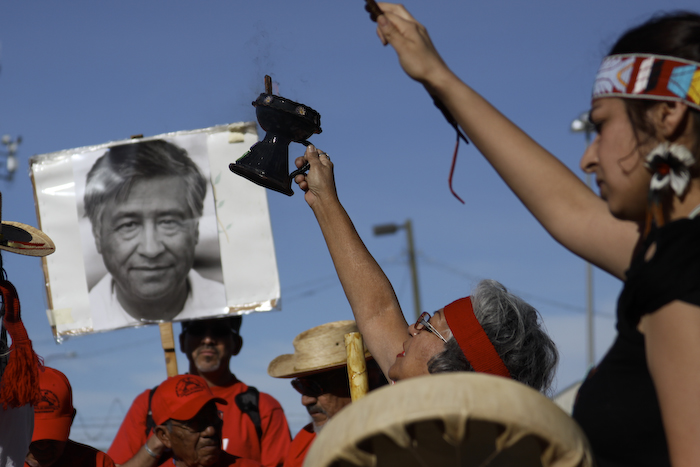18 years after his death, Cesar Chavez still battles in the Texas Legislature
By Miguel Cervantes
EL PASO – The after-effects of UTEP’s decision to preserve César Chávez Day as a holiday still continue to be felt both across the campus and frontiers beyond.
The decision, which was officially passed on February 8th, ensures that the holiday, held in honor of the Mexican-American champion of fair labor, will be celebrated by the students this year, despite the fact the campus will remain open to faculty and staff.
The decision comes as a result of a massive organizational effort by the UTEP student body, and is considered a decisive victory by its supporters. Yet very few people outside the campus might be aware of the enormous impact this decision makes in this state’s political arena.
The reason César Chávez Day was originally threatened with cancellation was due to a proposed decision by the state of Texas to re-define and eliminate the basic elements of the holiday. This act, known to the Texas State Senators as House Bill 505, proposes to replace the celebration of César Chávez’s birthday on this date with a lesser Hispanic celebration: “Texas Spanish Heritage Day” which would celebrate the first day of the Mexican War of Independence. This would also eliminate the need to make César Chávez Day a day of service, requiring a holiday, and instead make it an optional holiday for institutions to celebrate.
In the Texas House of Representatives, the debate against making the change is in full swing, with State Representative Roberto A. Alonzo fighting for the protection of the holiday. He has sent an open letter to the UTEP faculty and students congratulating them for their organized effort to preserve the holiday on campus this year. Among other praise, the Senator congratulates the campus for embodying a grassroots campaign in the tradition of César Chávez which “shows us all just how important the example set by Chávez and the United Farm Workers is to younger generations, and once again highlights the need to keep César Chávez day as an official holiday for Texans.”
On campus, the student body is no doubt pleased by the reinstatement of the holiday, but along with the pride comes the responsibility of discovering how to appropriately celebrate the holiday. In California, the State most recognized for celebration of César Chávez Day, does so by making it a day of service and encouraging individuals to perform community service in the same manner as is done nationally on Martin Luther King Jr. Day. Centro De Salud Familiar La Fe, one of El Paso’s most prominent public service organizations, celebrates César Chávez Day with an annual carnival held on the grounds of La Fe Preparatory School in Segundo Barrio the weekend following the holiday.
Even as we debate the legitimacy of the holiday in our own state government, an ongoing campaign attempts to make César Chávez Day a national holiday continues in Washington. Musician Carlos Santana is a major supporter, and President Barack Obama supported the instatement of the holiday as part of his presidential campaign. Any attempt to nationalize the holiday during his term of office, however, has not yet materialized.
The importance of César Chávez Day as a holiday clearly extends beyond a mere date on a calendar. It means a variety of things to a variety of people, be it a specific celebration of a hard working individual of Chicano descent, to an expression of our personal freedoms. One thing is for certain, however, despite the looming thread of its dismissal in the state of Texas, it is a holiday and a sentiment that will carry on through the entire nation.
 Miguel Cervantes
Miguel Cervantes

